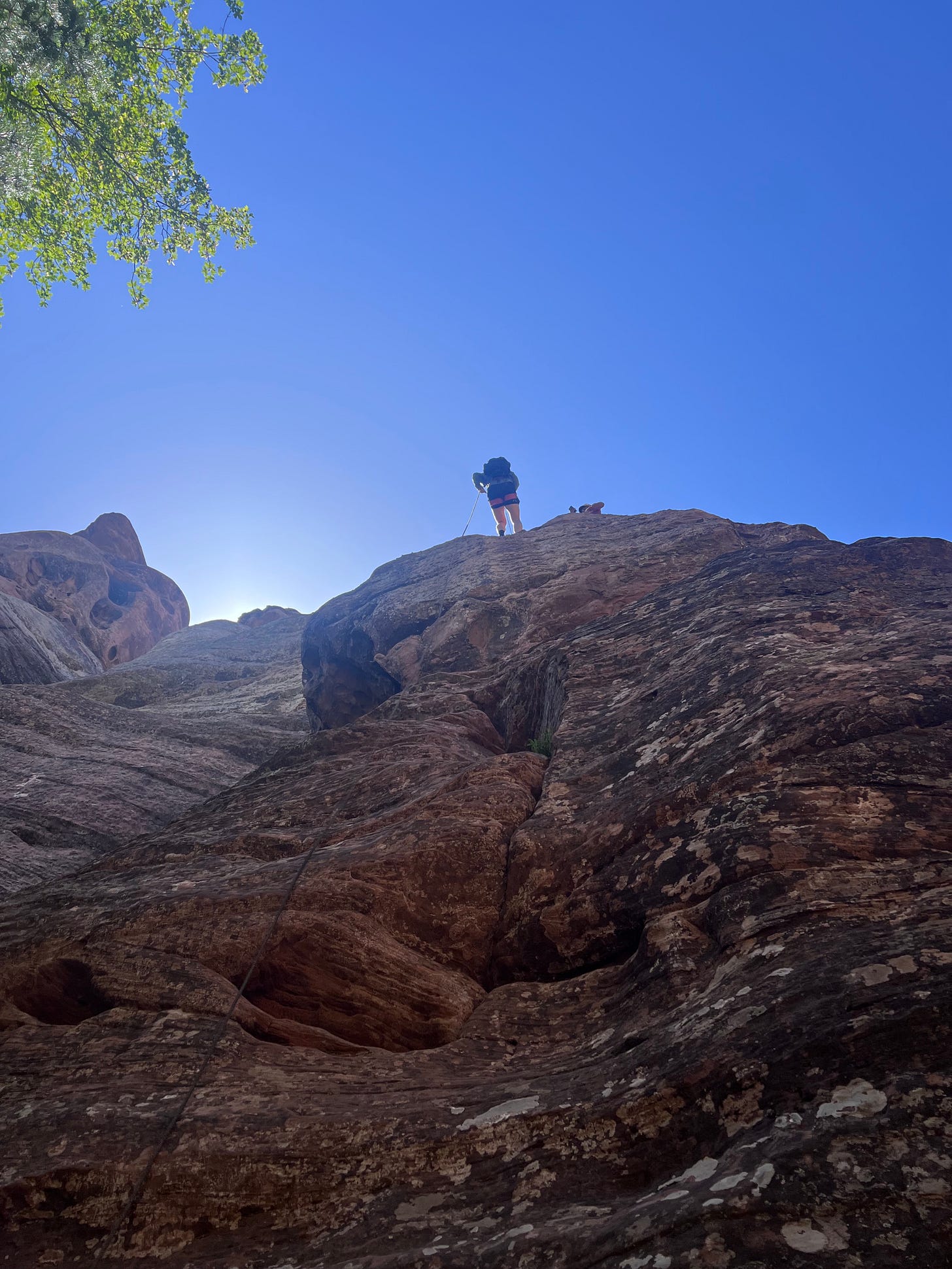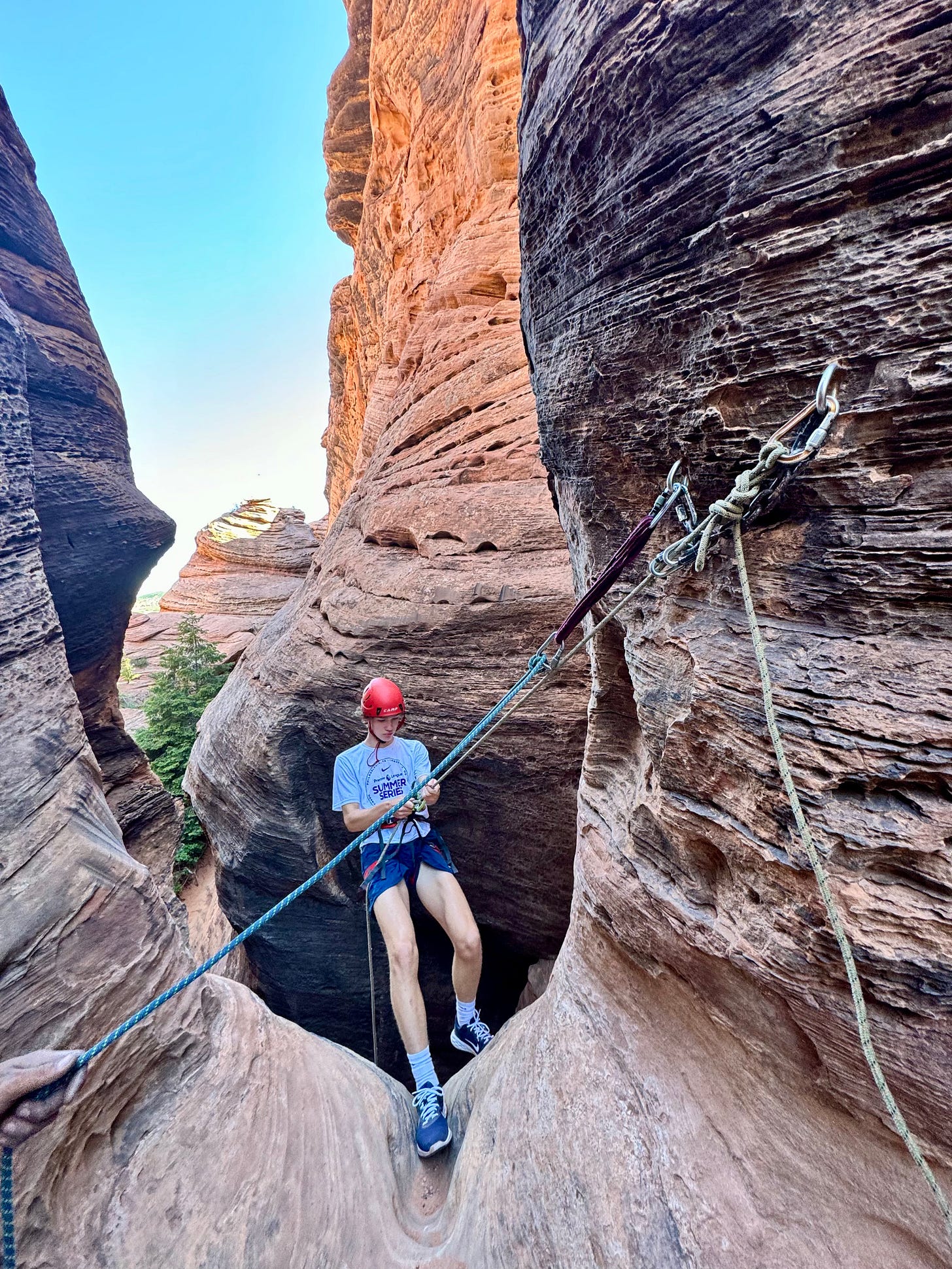Hello ♡,
Please note - I don’t know how to write in a helpful way from my secure home while parents grieve the children they’ve lost in Gaza, cities leveled, lives destroyed all over the region. I don’t have a profound insight to share with you. I want to acknowledge that honestly and refuse to look away.
I also know the model for mental health practitioners is one of: I am shiny and fixed, and let me help you achieve the same. The model for self-help is a 1-2-3 process of how I got from the “messy there” to the “amazing here.” But we all know deep inside this is false, even if the propped up certainty of it is attractive. We all take turns helping and being helped. I feel the tension of breaking that mold as a writer and practicing therapist. I also would be suspicious of any “helping professional” that isn’t attuned to their own vulnerability and needs. And I find, I am more helped by those who are well versed in their own vulnerability. When you are in deep waters, you need people who know how to swim. When you are on a cliff, you want someone who has gone over, and learned how to navigate, their own edge too.
I have my surgery very soon, and I don’t really want to talk about it. I would like to hold my breath and wait for it to be over. But I know this is my resistance to the vulnerability of it all. And so I am being really gentle with myself, holding my own hand, and asking my people to hold my hand too.
It’s not just the physical and emotional vulnerability of the process. It’s that I don’t know what they will find. I don’t know if this will be a “good news relief” with a new plan for monitoring my high risk, or a “bad news” entry into a cancer journey. I know enough about binary thinking to know this is too simplistic. But that’s how it feels.
And I don’t want to feel these things.
If I had my way, I would live bubble wrapped. Like actually. But the bubble wrap would be soft blankets, low noise, maybe a soft fan because I like fans, some dinner plans, and zero risk. As a highly sensitive introvert, this is my inclination. I know this isn’t very cool to say. It would be cooler to say I am the first to jump off a cliff. But then I would be lying.
As it turns out, I was second to go off a cliff last weekend, right after my son. I repelled off said cliff, which is pretty much like jumping with a rope in my humble opinion. This was no longer great timing for the trip we planned ages ago. I felt as brave, settled, and up for it as you can imagine: I didn’t want to go.
Last week we talked about feelings - and the freedom that comes in feeling them all. Yes, even when socially awkward. We talked about the importance of feeling them to experience the good stuff in life - connecting to one another and ourselves. We also acknowledged that feeling them isn’t living out of control. In fact, it is often the refusal to feel our feelings that leads to saying or doing things we regret when we finally explode.
So why the recap?
Feeling your feelings is just everyday language for vulnerability. Feeling your feelings is the practical embodiment of vulnerability, and it is also why we avoid feeling them.
We don’t want to feel things because it makes us feel vulnerable.
Vulnerability1 is any time you are anything but bubble wrapped. It is telling someone how scared you are instead of trying to look strong. It is refusing to look away from suffering - yours or someone else’s. It is letting yourself feel sad, or scared, or outraged. It is refusing to put a bow on someone else’s story, or your own. It is refusing to numb ourselves to the suffering of others. It is doing things you are scared of physically, emotionally, relationally, or mentally. It is the opposite of a comfort zone.
“There is no courage without vulnerability. Courage requires the willingness to lean into uncertainty, risk, and emotional exposure.” - Brené Brown
Vulnerability is essential to any kind of courage. The courage to use your voice, to be close to someone, to share your needs, to do something you are scared of, to be helped instead of the familiar role of helper, to refuse to bubble wrap yourself from your own fears or the lives of others. It is living in the reality of our shared human fragility. And not holding your breath, but allowing all of it to impact you. To love, to care, are truly vulnerable.
And it isn’t really jumping off a cliff. People that are not scared to jump off a cliff are not doing something vulnerable in that moment. It can look brave but not be vulnerable if it doesn’t scare you.
Vulnerability is going off a cliff and being scared to do so. It is uncomfortable, to say the least.
It is like me awkwardly staring into the eyes of our repelling guide, a total stranger moments before, as he guides me learning to repel down the cliff. Inch by inch I slowly lowered myself down, feeling the air behind me, asking him far too often, “Am I doing this right?” Feeling my legs shake a bit, the rope burn my unexperienced hands. Hearing the cheers from my happy son below, proud of his mom. Feeling relieved when I got to the bottom, and looking up in awe. Swearing I will never do that again, but feeling more alive than any bubble wrap moment I have tried to create. And feeling so connected to it all, and to my family.
Vulnerability is where the good stuff is, but it doesn’t look like Instagram reels or old 90s motivational posters. It doesn’t have to involve repelling or surgery. It is often slow, and clumsy, and may require a rope or a floatie. It may need lots of starting and stopping, and always benefits from hand holding and breaks. Being vulnerable, and therefore courageous, isn’t always outwardly impressive. But it is inwardly rewarding. Because instead of being left alone, we meet ourselves, we meet each other, and we even meet God when we allow ourselves to be vulnerable.
You don’t need to jump off a cliff to be vulnerable.
You may need to gently lower yourself down, inch by inch. You may need a spotter, and some hand holding, and some time. You may need to go slow. You may need a soft blanket break. It may require the support of your few safe people. It probably won’t be on Facebook, except rare occasions. It may be in individual texts, not group texts. It may be with a therapist first, then others. It may be awkward, but it will make you feel more alive than bubble wrap. And we need your vulnerability too. It makes all of us feel less alone when we show each other how human we are.
With you,
Monica
New Addition - An Optional Reflection:
One thing I have been so moved by are the messages by so many readers here. I think, what an incredible group of humans. You all are tender, and kind, and thoughtful. I have received the most beautiful messages - as well as prayers and poems I’d never read before that are treasures to me now.
And so I thought, could it be nice for you all to benefit from that with one another too? To experience how great you each are?
Listen, I hate it when I am in a class or training and I am asked to answer a question out loud, or told to work in a group. My tendency is always to be quiet. And this is a good thing. And yet, often on the other side of sharing, I am glad I did, and I learn more. I know many of you will not want to, or never choose to, share in this new reflection option at the end of the newsletter. And I affirm the crap out of that. I honor that.
But for those of you who would like to, I will be adding an optional short reflection you can share with everyone, and I would encourage you to respond to one another if something moves you. There are no rules except just one: Please only share things that will feel good to share in this format. Meaning, it is a brief and written format. If you need more love and care (validly so) for what you are sharing, then another in-person format you have in your life would honor that better. This is a time for mutual thinking and reflecting, it’s not powerful enough to meet an emotional need.
So, first Optional Reflection:
What are the supports that allow you be vulnerable? Is it time? small numbers? that one safe person? going slow?
Or
What is one feeling, or role, you’re often reluctant to be vulnerable in. Example: you may be more comfortable being the helper than being helped.
Or
A prayer or poem by someone that comes to mind for you, or any other thought.
New! Episode 127
Mental Health Check-In: The Hidden Why Under Comparison
This week's Mental Health Check-In unpacks the common tendency to compare yourself to others. In this short episode, we will look at it from a different perspective. With a lens of compassion and curiosity, we will explore the hidden "why" under the tendency to compare. Maybe you will find your "why," in this episode, or maybe it will prompt you to discover your own not listed here. Either way, this episode is an opportunity to unpack and get a little more clarity on this common tendency. And clarity, as well as self-awareness, are some of the best places to start with any hope of change.
My understanding and application of vulnerability here and in my practice is attributed to the work of Dr. Brené Brown.







What helps me with vulnerability? I think for me, it's just a reminder that my strength lies in vulnerability. And an invitation to be vulnerable. Thank you, Monica, for this reminder and invitation.❤️
I’m learning to embrace asking for help rather than doing it myself and/or always being the strong helper, especially with my husband.
I’m also risking rejection by letting some of my true feelings be seen. This one is with our DIL, who lives with us and is untrusting much of the time. I’m not dimming my joy or pretending everything is ok if it’s not.